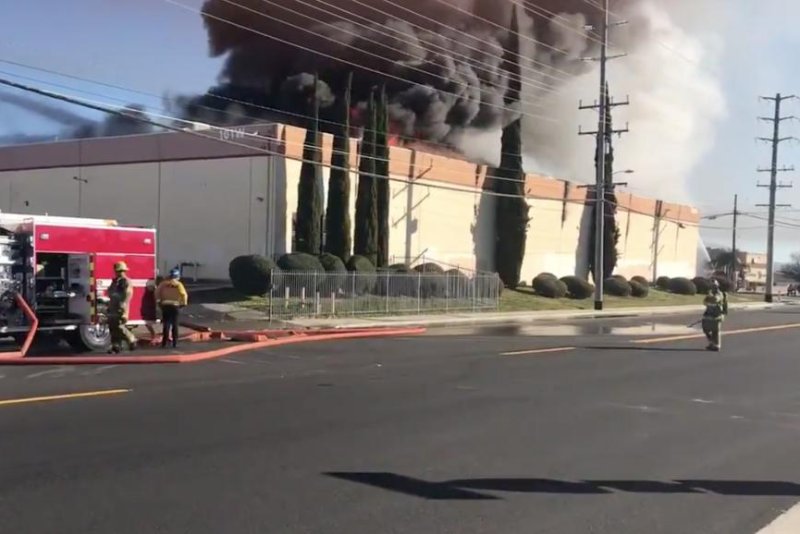
A fire that destroyed the Apollo Masters factory in Banning, Calif., on Feb. 6 caused a break in the supply chain for vinyl records, industry sources said. Photo courtesy of Cal Fire Riverside
Feb. 20 (UPI) -- Vinyl records survived the onslaught from CDs, but a factory fire at a California manufacturer of special parts may have broken a key link in the supply chain.
The Apollo Masters plant in Banning, Calif., which burned down Feb. 6, was the sole U.S. source of the blank lacquer master disks engineers cut on special lathes
The ability to press new vinyl records could be hurt until a new, large-volume manufacturing source can be found, industry observers say.
"Obviously, it's really tough news, and nobody was injured [in the fire], thankfully," said Matthew Fiedler, CEO of Denver-based Vinyl Me, Please, a record-of-the-month club and online record store.
RELATED 'High Fidelity' star Zoe Kravitz misses the 'community' of record stores
"One of the things that this made pretty clear is that the manufacturing supply chain in the vinyl industry is pretty fragile, and there's a ripple effect," Fiedler said.
Closing in on CD sales
Vinyl record sales have been growing, hitting some $225 million in 2019 -- almost as much as the $247.9 million in CD sales last year. That is the first time since 1986 that vinyl came even close, according to the Recording Industry Association of America.
RELATED Ariana Grande to re-release studio albums on vinyl
Vinyl accounts for 4 percent of total U.S. music sales, which are dominated by streaming services and digital downloads.
The only other producer of lacquer master disks is a small Japanese company, MDC, which produces a small percentage of the world's supply, said Culver City, Calif.-based audio engineer and vinyl historian Len Horowitz, owner of History of Recorded Sound, a high-fidelity record company.
Vinyl records survived threats from the growing popularity of radio in the 1920s and reel-to-reel tape in the 1950s, as well as the rise and fall of the CD, "because they are really part of the art world," Horowitz said.
RELATED Beyonce vinyl accidentally features Canadian punk band
"Records' sound quality is excellent and continues to improve in the 21st century. But they're also part of something I call 'havingness.' People like to have things -- something worthwhile to show your friends," he said.
Creating vinyl is a form of artisanship, Horowitz said. "The employees at Apollo have highly specialized skills. Many of the processes were apprenticed and handed down for 30 years."
Apollo used a patented process from the 1930s to apply a thin, flawless layer of lacquer on highly polished aluminum plates, Horowitz said. The deep reddish blue lacquer, derived from tree sap, is kept pliant with castor oil in a proprietary process. Each side is cured for six weeks. The master disks sell for about $40 each.
Volatile lacquers
Because of restrictions on manufacturing with lacquer, there's even a question whether the business can rebuild without special permission from the U.S. Environmental Protection Agency, Horowitz said.
"All lacquers are volatile and require safety precautions. It's amazing they managed to keep that place running without incident for 40 years," he said.
Apollo Masters owner Terry Carlson could not be reached for comment.
"We are uncertain of our future at this point and are evaluating options as we try to work through this difficult time," the company posted on its website.
Adam Gonsalves, vinyl mastering engineer for Willie Nelson, Sun Ra and Elliott Smith at Telegraph Mastering in Portland, Ore., said he thinks a shortage of lacquer disks will hit in a few months, especially at larger companies that pump out numerous releases.
"I had an engineer call me and try to buy $25,000 worth of lacquers from me," he said.
Mastering engineers "cut" the blank disks on a revolving turntable and they then are sent off to be electroplated in a bath of nickel and silver. The metalized master is pressed into a negative metalized stamper mold, which is used to press vinyl plastic into records at one of the few remaining record plants in the United States.
The special sapphire styli used on the revolving mastering lathes were also produced by Apollo.
Another mastering process, called direct metal mastering, was developed in Europe and does not require a lacquer process. But it's expensive, and not many machines are in operation, engineers said. Most companies using this system are at capacity.
New technology
Vinyl records still are produced because a demand exists for them, and the uncertainty around the supply chain might be a time to try new technology, said Drake Coker, founder of Scratch Vinyl, a startup that is patenting new ways to manufacture records.
"CDs are office supplies. Records are art," Coker said. "The biggest outcome from the Apollo incident might be a call for innovation. It might be a plea from the universe that it's time to do something."
But new technologies, if they even work, might be years away.
Still, in the specialized market for long-playing records, demand is strong.
"For lots of people, there was never a vinyl downturn," Gonsalves said. "For various pop music subcultures, dance music, hip hop, underground punk and metal, vinyl remains the release format of choice, in perpetuity."
The drying up of the mastering lacquers supply may spike costs for vinyl recordings, which already can run more than $20.
But vinyl has too strong a pull for that to be a death sentence for the market, Fiedler said. A break in supplies might have made a difference 20 years ago, "when everyone thought records were dead in the water," he said.
"But now, it might actually drive more demand for the format, and the perceived value of records will increase. For vinyl collectors, for better or worse, when there's scarcity, there's more demand for it."
---30---
No comments:
Post a Comment